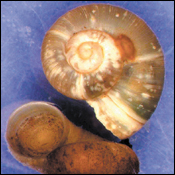 |
The
state Department of Conservation and Recreation is studying
the impact that chemicals would have on the endangered Boreal
Turret Snail before applying herbicides at Lake Cochituate. |
http://www.metrowestdailynews.com/localRegional/view.bg?articleid=107187
Metro West Daily News (Massachusetts)
August 27, 2005
Lake Cochituate herbicide plan slows
to a crawl
By Claudia Torrens / Daily News Staff
NATICK -- A tiny and slippery creature at Lake Cochituate could
change an upcoming state plan to use herbicides to control milfoil
at the lake.
The state Department of Conservation and Recreation is studying
the impact that chemicals would have on the endangered Boreal
Turret Snail before applying the herbicides, said Bob Bois,
the town's environmental compliance officer.
"They are looking at this issue before going on,"
said Bois.
The snail, also known as Valvata sincera,
is listed under the Massachusetts Endangered Species Act as
endangered. The state's list of snails considers it locally
rare and has a record of it in the Sudbury-Assabet-Concord Rivers
watershed.
Mike Gildesgame, the DCR's acting director of water resources,
could not be reached for comment to confirm the study of the
herbicide impact.
The state proposes using chemicals to treat the entire lake
and not just certain spots as a more drastic way of controlling
milfoil, which is spreading aggressively, said Joe O'Keefe,
assistant secretary of environmental affairs. The
chemicals are fluridone, a white crystalline solid with
no odor, and diquat, a general use herbicide.
A group of residents opposed to herbicides has appealed the
state plan, claiming the chemicals will kill the endangered
creature.
"They adversely affect the snail," said Martin Levin,
the lawyer for the two dozen residents.
Levin said, although he could not confirm it, his understanding
is that the state has hired an expert to determine the impact
of chemicals on the mollusk. He and his clients counter that
herbicides pose risks to the lake's animals and plants and threaten
Natick's drinking water.
The residents appealed the first herbicide plan the state
put forward in 2003 to control milfoil. That plan said Lake
Cochituate was "a habitat for the snail," said Levin.
When the appeal was denied last year, the group challenged that
decision to the state Division of Administrative Law Appeals.
Now, the DCR has set aside the appeal because the milfoil
situation "is much more severe," said O'Keefe. The
state is working now on the new plan proposing the use of fluridone
and diquat.
In a letter sent to the Natick Conservation Commission in
May 2003, the Natural Heritage and Endangered Species Program
said the application of herbicides would not harm rare species.
"It is our opinion that this project, as currently proposed,
will not adversely affect the actual habitat of rare wildlife,"
said the letter.
Levin said, however, that after a public records request,
a Natural Heritage official confirmed that no evaluation had
been done on whether herbicides would harm the snail.
"He stated that the (Natural Heritage program) does not
have the resources to conduct such searches," said Levin,
when he allegedly asked the official whether the species still
inhabited Lake Cochituate.
O'Keefe said the snail, which has a shell up to 5 millimeters
in diameter, "may or may not change the plan."
"We are looking at the entire picture as it stands,"
said O'Keefe. "We are comparing the situation to last year.
We want to make sure herbicides are safe to use."
Levin has cited in the appeal the work of Emily Monosson, a
research toxicologist, who says the herbicides will kill the
snail.
"Since Valvata sincera lives and breeds in association
with aquatic vegetation, killing the vegetation will kill any
associated Valvata," Monosson said in a report.
Claudia Torrens can be reached at 508-626-3976 or ctorrens@cnc.com